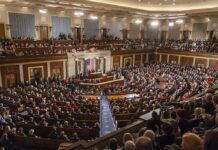
The Trump administration is considering a sweeping overhaul of the U.S. State Department, provoking heated debate.
Key Insights
- The reorganization could lead to the closure of many embassies in sub-Saharan Africa, and consolidation into four regional corps.
- A shift from diplomatic representation to artificial intelligence is proposed, alongside budget cuts.
- Key offices associated with climate, women’s rights, and democratic initiatives would be dissolved.
- The Foreign Service Officer Test would be replaced with evaluations aligned with the administration’s foreign policy perspective.
- Controversy surrounds the proposal, with criticism dismissed by some as based on a fake document.
A Transformative Vision
According to reports, President Trump’s draft proposal plans to reform the State Department according to an “America First” strategy. The proposal involves a considerable reduction in the U.S. diplomatic footprint, particularly in Canada and Africa, and advocates replacing some diplomatic roles with artificial intelligence. The restructuring also suggests regional consolidation, creating efficiency by merging current regional bureaus into four larger “regional corps.”
Beyond geographical changes, the order advocates closing non-essential embassies in sub-Saharan Africa. State Department offices addressing issues such as women’s rights, democracy, and climate change would be shuttered. This substantial realignment echoes a major shift in U.S. foreign policy priorities, focusing more on counterterrorism and resource management rather than diplomatic engagement. Meanwhile, concerns loom about the implications of decreased American influence.
China will quickly fill any political/economic void we create in Africa by withdrawing from the continent… https://t.co/OTOw9CWete
— Politics1.com (@Politics1com) April 20, 2025
Reimagining Diplomatic Evaluation
The draft outlines changes to the Foreign Service Officer Test, proposing a transition to evaluations based on policy alignment with the administration’s vision. The intent here is to align personnel with the current foreign policy views, effectively integrating the “America First” doctrine into the selection process. Furthermore, a buyout program is announced for employees opting out of this evolving structure, marking a new era in diplomatic hiring practices. The State Department is preparing for these changes, which are set to be finalized by October 1.
One diplomat, in a statement to Politico, called the plan “bonkers crazypants.” Despite skepticism over the proposal’s authenticity and claims from Secretary of State Marco Rubio insisting the document is “fake news,” the implications of this draft cannot be underestimated. The shift could potentially halve the State Department’s budget down to $28.4 billion, raising concerns about service disruptions for Americans abroad.
A draft of a Trump executive order proposes a drastic restructuring of the State Department, including eliminating almost all of its Africa operations
It also calls for cutting offices on climate change, refugee issues democracy and human rights concerns https://t.co/gl8KUB9hRx
— Jonathan Lemire (@JonLemire) April 20, 2025
Global Ramifications
While the document is reportedly seeking to assert American power through streamlined global operations, this realignment raises numerous concerns. The restructuring may open the door for other global powers, such as China and Russia, to fill the void, particularly in Africa. Some reports reflect growing apprehension among American diplomats, as the changes could dramatically alter U.S. diplomatic engagements worldwide.
The plan has ignited considerable debate both within the political establishment and among international allies. As the world watches, the proposed changes symbolize a substantial pivot in U.S. diplomatic strategy, sparking debates about the future of American influence and the foundational principles underlying international relations.
Sources:
- Diplomats Are Freaking Out About Trump’s Leaked Executive Order
- Trump draft executive order would make sweeping changes to the U.S. State Department – DNyuz

























